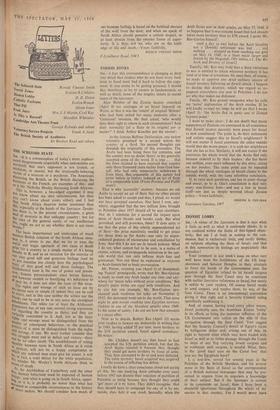ZIONIST LOBBY
SIR,—A virtue of the Spectator is that it says what it feels as well as what it cautiously thinks. It is not confined within the limits of thin-lipped objec- tivity. But am I at fault in coming to the con- clusion that it exclusively feels, and rarely thinks, on subjects affecting the State of Israel; and that in this connection its feelings are suspiciously like prejudice?
Your comment in last week's issue on what may well have been the foolishness of the US long- shoremen and Senator Douglas in their attempts to force the hands of the Government over the question of Egyptian refusal to let Israeli cargoes pass through the Suez Canal may be consistent with earlier Spectator references to Israel, but surely is unfair to your readers. Of course Israel wants to send cargoes, and receive them, by way of the Suez Canal. There is an international convention giving it that right and a Security Council ruling specifically confirming it.
And, of course, having tried every other means, Israel probably uses the American Zionist 'lobby' in its efforts to bring the immense influence of the US Government into action on the side of free navigation through the Suez Canal. You suggest that the Security Council's denial of Egypt's claim to belligerent status and, arising out of this, its right to boycott ships which may have traded with Israel as well as to refuse passage through the Canal to ships of any flag carrying Israeli cargoes and to confiscate such cargoes, is invalid. What, then, is the 'good legal case on the Canal ban' that you say the Egyptians have?
I, a non-Jew, served for several years in the Palestine of the British Mandate, and for several more in the State of Israel as the correspondent of a British national newspaper that may be pre- sumed to require from its reporters a knowledge of their subject. But if the Spectator is correct in its comments on Israel, then I have been a shameful ignoramus throughout the whole of my service in that country. For I would never have
dreamed that Israel has been at pains `to embroil the West with the Arabs.' From Zaghlul Pasha to Rashid Afi and Colonel Nasser, and from Adolf Hitler to Nikita Khrushchev, surely it has not needed Israel to embroil the West with the Arabs.
It may properly be said that if Israel had never come about, and there had never been so much as a Balfour Declaration, and *the squalid back- stairs intrigues and pressures'—an unnecessary 2xaggeration that, is it not?—at UN had not led to the Partition Resolution, we of the West would have had that much less to worry about in the Middle East. But these are hardly arguments to be used against the half-million Jews who founded the State of Israel or the one million who found refuge there from DP camps and other areas of wretchedness.
The main trouble seems to be that Israel, in spite of Arab boycott and a border insecurity that involves her in outrageous defence expenditure, and in spite of trebling her population in a little over ten years, has prospered, and in her prosperity and stability has justified herself and made to look silly the confident expectations of so many that she could not survive. And from the Soviet point of view the trouble is that Israel has not only wrvived and prospered, but has also adopted and tmazingly developed institutions and policies in Accordance with Western principles instead of along the lines hoped for when the Soviet Union at UN supported the setting up of a Jewish State in Palestine.
All this, no doubt, has been said before. I regret that it should be the Spectator that has provoked me to say what must be fairly well known and is, of course, easily verifiable.—Yours faithfully, [The failure of Israel to take the dispute to the International Court indicates that she, at any rate, is unconvinced of her own case on it.—Editor, S'peciator.]





































 Previous page
Previous page